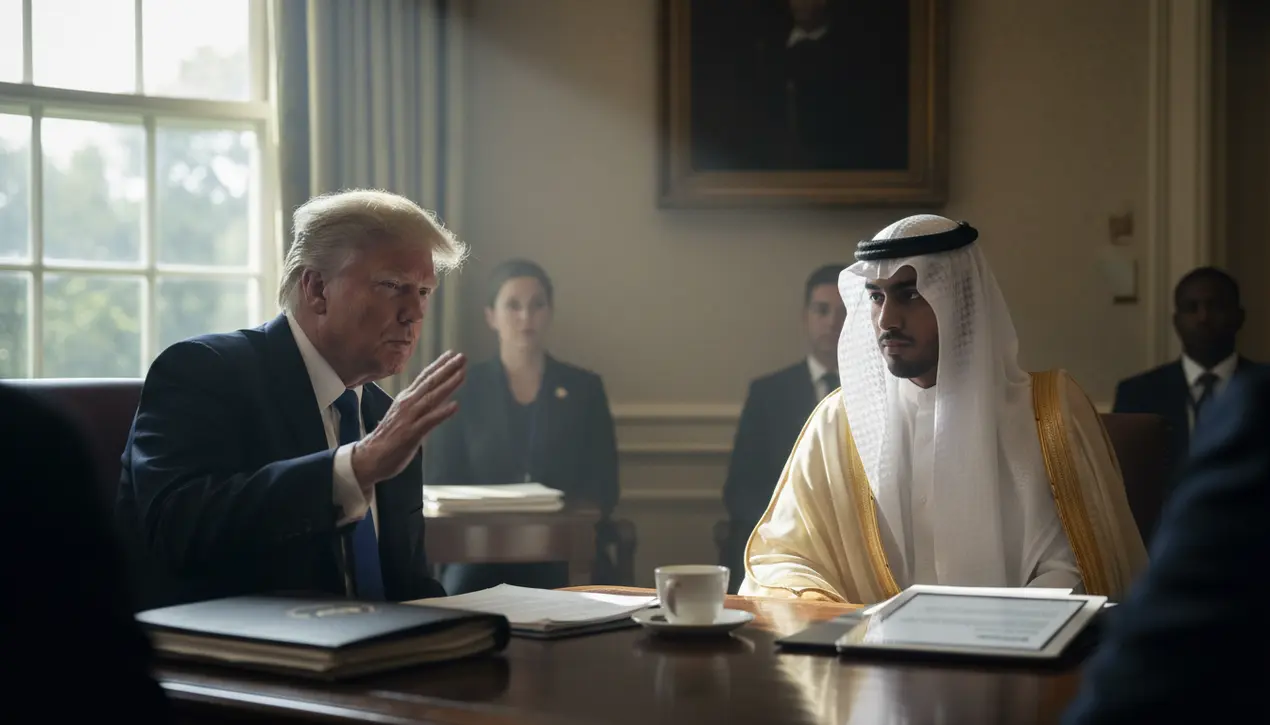
PoliticsdiplomacyBilateral Relations
Strategic Necessity Trumps Scandal: The Enduring US-Saudi Alliance
RO
Robert Hayes
3 hours ago7 min read
President Donald Trump’s recent Oval Office meeting with Saudi Crown Prince Mohammed bin Salman was notable not for its substance, but for the feigned surprise it generated in Washington. The session, theatrical and combative, saw Trump dismiss a question about the 2018 murder of journalist Jamal Khashoggi with a wave, stating, 'A lot of people didn't like that gentleman.Whether you like him or didn't like him, things happen. ' This was not a break from precedent but a continuation of a posture established just weeks after the killing, when Trump cast doubt on U.S. intelligence findings.While shocking in its cavalier disregard for a state-sponsored murder, the moment underscores a deeper, more enduring reality: for eight decades, the strategic alliance between the world's most powerful democracy and its most powerful absolute monarchy has been deemed too vital to be derailed by human rights concerns. This pattern of realpolitik transcends any single administration.President Joe Biden, who once vowed to make the crown prince a 'pariah,' was fist-bumping him in Riyadh by 2022, driven by the geopolitical imperatives following Russia’s invasion of Ukraine and spiking oil prices. Before the October 7th attacks, the Biden administration was actively pursuing a monumental three-way deal involving a U.S. -Saudi defense treaty and Saudi-Israeli normalization—a framework whose underlying logic has seamlessly carried over into the current Trump administration, now wrapped in a chummier personal rapport.This renewed camaraderie has yielded tangible fruits: a pledged $1 trillion in Saudi investments into the U. S.economy, a promise to purchase 300 American battle tanks, and Trump’s commitment to approve the sale of F-35 fighter jets, alongside an elevation of Saudi Arabia to 'major non-NATO ally' status. The relationship has also evolved beyond its traditional foundations of oil and defense; the Kingdom is now aggressively positioning itself as a major player in AI and data centers, with an investment forum attended by tech titans, while the U.S. eyes Saudi Arabia as a potential new source for rare earth minerals.Domestically, Saudi society has undergone rapid liberalization under MBS, with the religious police sidelined and restrictive gender laws lifted. Yet, it remains an absolute dictatorship where political opposition is ruthlessly suppressed.The warm, though partisan, welcome MBS received on Capitol Hill this week, with former critics now in the room, signals that the post-Khashoggi pariah status has unequivocally ended. However, this bromance has distinct limits.Trump desires Saudi accession to the Abraham Accords, yet MBS was noncommittal, stating that Riyadh wants 'to be part of the Abraham Accords, but we want also to be sure that we secure a clear path to a two-state solution. ' While Palestinian rights may not be a primary ideological driver, a nation aspiring to lead the Islamic world cannot afford to ignore the widespread fury provoked by the war in Gaza.Furthermore, for all the advanced military hardware now flowing to Riyadh, the U. S.remains unlikely to provide the formal, Congress-ratified defense guarantees the Saudis truly crave. In this dangerous neighborhood, Saudi Arabia still needs the U.S. as its primary defense partner, but its increasingly close economic ties with China and a recent defense pact with nuclear-armed Pakistan highlight a deliberate and strategic hedging of bets.The relationship, for now, is indeed too big to fail, sustained by mutual need. Yet the enduring question is not how much the United States can stomach its alliance with an absolute monarchy, but whether Saudi Arabia, navigating an unpredictable world, will continue to deem a relationship with an increasingly unpredictable America indispensable.
#US-Saudi relations
#Donald Trump
#Mohammed bin Salman
#diplomacy
#arms deals
#investment
#human rights
#featured
Stay Informed. Act Smarter.
Get weekly highlights, major headlines, and expert insights — then put your knowledge to work in our live prediction markets.
Related News
Comments
Loading comments...
© 2025 Outpoll Service LTD. All rights reserved.